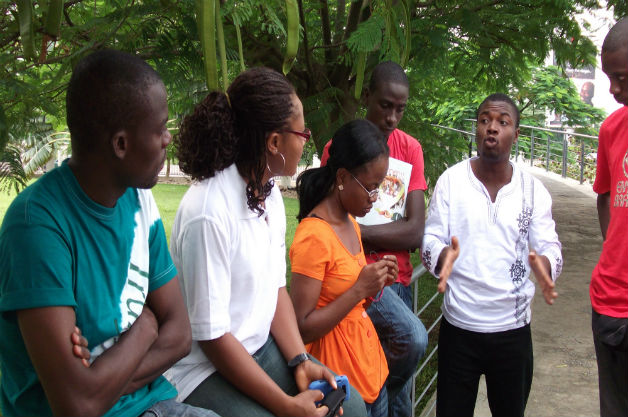“Accidental tourists – the people who have ruled Nigeria"
May 20 Young Nigerians need to start making their minds up about the kind of leaders they will be when they eventually have access to power, writes Emmanuel Ojeifo, 26, from Ibadan, the capital of Oyo state in western Nigeria.
Young Nigerians need to start making their minds up about the kind of leaders they will be when they eventually have access to power, writes Emmanuel Ojeifo, 26, from Ibadan, the capital of Oyo state in western Nigeria.
Just imagine this scenario. Some elderly men in a car have just had a terrible accident because not one of them, not even the driver, is qualified to drive.
The car is with a mechanic who is currently working on it to bring it back to shape. Suddenly, some young guys emerge who are a bit tipsy on alcohol and ask that, in such bad shape, the car be given to them for a ride.
What do you think? That is the nature of current discourse in Nigeria. Bishop Matthew Hassan Kukah was the one who coined the expression “accidental tourists” to describe the class of people who have ruled Nigeria since independence.
They never had any articulated blueprint upon which they sought power and position. They were people who stumbled upon power by sheer luck and applied it uselessly. They played politics without principles and applied power without morality. That is why the seasoned American diplomat, John Campbell, in his biting narrative about Nigeria’s political situation, ‘Nigeria: Dancing on the Brink’ argues.
Campbell says that since the end of the Civil War, Nigeria’s top political elite are those who have played the game of politics, lost and lived to play again. That is why in the last four decades or more, politics in Nigeria has been a business of recycling the old stock: people who are drunk for power not because they are interested in the common good, but because they have an eye on the spoils of political office.
Today, there is a groundswell of activism from progressive young intellectuals who are demonstrating their capacity for leadership across many spheres of youthful endeavours. While many of these people have argued that we need to drastically cut the access of the ‘old stock’ to power and allow young people to have more access to power, I really don’t think that many young people understand the nature of power and what it is meant to serve. It takes more than novelty and youthful exuberance to lead Nigeria.
Towards the end of his opening speech at the Nigeria Symposium for Young and Emerging Leaders 2012 held on March 19, 2012 at the Shell Hall, Muson Centre, Lagos, Chude Jideonwo, Executive Director of The Future Project articulated a number of these issues with clarity and forthrightness. He said that “..it’s high time we cured ourselves of a certain blind optimism in the power of the ‘youth’. The young have it in them to be as clueless and as corrupt and as close-minded as the old. Our social media savvy and general openness to technology will not by itself save us.”
He then added: “What arrogance to think that we are better than those presently in leadership just because we were born in a different generation!” When young people have access to power, “it is not just to say ‘I will not be corrupt!’ Passion alone cannot withstand corruption. When you enter government for instance, you have to navigate a dysfunctional civil service, an entrenched patronage-and-sycophancy system, a systemic disregard for honour, ample opportunities for corruption, the ethnic and parochial fault-lines. You have to have be prepared.”
This is how Jideonwo ended his speech: “Young Nigerians ought to start toning down that ‘Na we turn, give the youth a chance!’ noise. It won’t save us from driving Nigeria deeper into a hole, when the buck begins to stop at our tables. The noise we should be making, instead, should be around this question: ‘What can we do NOW, to increase our chances of making Nigeria work, when the time comes?'”
I think that Jideonwo has said it all. Let us not take it for granted that, because we have a bubbling generation of young people who are progressive and forceful in their demands for access to leadership, that we are sure that they will be different from their fathers before them. The challenge before young people today is to begin to talk intelligently about our nation.
Even though part of this intelligent conversation requires that young people begin to taste what power and public trust is, what is important for the here and now is to arm ourselves with the values, the determination, the vision, the dedication, the preparedness and the abiding commitment both in principles and in praxis that will make us the turning point generation. We need to start making our minds about the kind of leaders we will be when we eventually have access to power. We need a guide; a blueprint.
Unless the tipsy young men are suitably qualified to put the panel beat car back on the road by obtaining their drivers’ license and purging themselves of the exuberant influence of alcohol under which they are acting, they will inevitably be headed for ruin like their elders who had a terrible crash.
…………………………………………………………………………………………………………………
Opinions expressed in this article are those of the author and do not necessarily represent the views of the Commonwealth Youth Programme. Articles are published in a spirit of dialogue, respect and understanding. If you disagree, why not submit a response?
To learn more about becoming a Commonwealth Correspondent please visit: http://www.yourcommonwealth.org/submit-articles/commonwealthcorrespondents/
…………………………………………………………………………………………………………………




